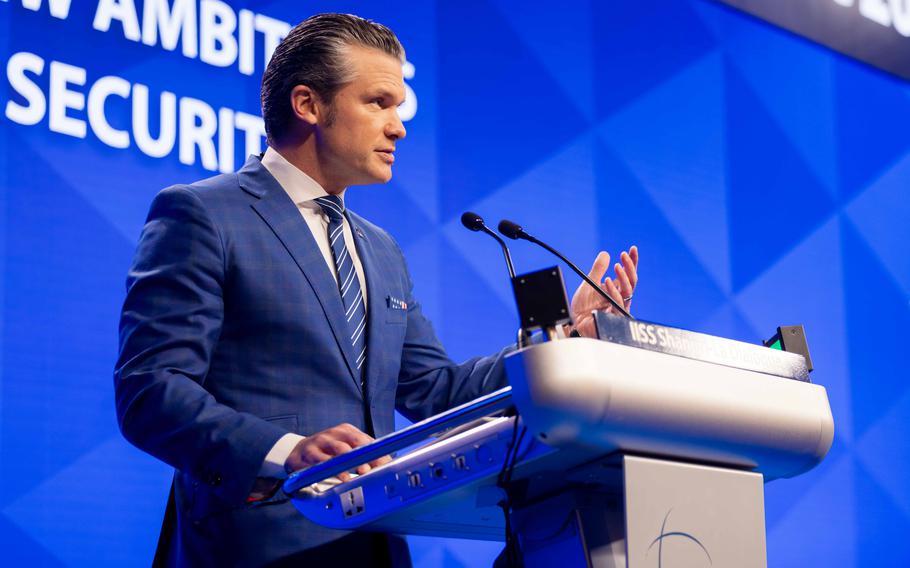
Defense Secretary Pete Hegseth speaks at a security conference in Singapore on May 31, 2025. (International Institute for Strategic Studies)
STUTTGART, Germany — Germany’s efforts to ramp up defense spending won it rare praise from the Trump administration over the weekend, when Berlin was held up as an example for Asian countries to follow.
Defense Secretary Pete Hegseth, speaking Saturday at a security conference in Singapore, said a push by NATO members to boost defense spending levels to 5% of gross domestic product should be matched by countries in the Pacific.
“It’s hard to believe … I’m saying this,” Hegseth said during a speech at the annual Shangri-La Dialogue. But Asian “allies should look to countries in Europe as a newfound example. NATO members are pledging to spend 5% of their GDP on defense, even Germany.”
Hegseth’s comments come ahead of high-stakes talks between President Donald Trump and new German Chancellor Friedrich Merz, who visits Washington on Thursday.
Germany has been repeatedly singled out for criticism by Trump, who has blasted Berlin over its military shortcomings.
During Trump’s first term, Germany’s lackluster defense spending was one of the factors involved in a plan to pull 12,000 U.S. troops from the country.
This year, for the first time in decades, Germany hit the NATO benchmark of spending 2% of GDP on defense.
But concerns about Russian aggression in Europe following the Kremlin’s 2022 full-scale invasion of Ukraine, coupled with the return of Trump to the White House, have resulted in NATO countries signaling a willingness to spend even more on security.
Trump has demanded that NATO establish a new spending benchmark of dedicating 5% of GDP on defense.
Several key allies, including Germany, have said they are on board with the plan. Details are expected to be worked out on Thursday during a NATO defense ministers meeting in Brussels, which Hegseth will attend.
“We’re pushing our allies in Europe to own more of their own security — to invest in their defense, things that are long overdue,” Hegseth said Saturday.
He added that allies are “stepping up.”
Merz, after his party received the most votes in Germany’s elections in February, said uncertainty about the United States’ future military commitment required Europe to prepare for its own defense.
“My absolute priority will be to strengthen Europe as quickly as possible so that step by step, we can really achieve independence from the USA,” Merz said at the time.
Germany also has lifted its “debt brake,” which placed strict limits on deficit spending that could contribute to defense.
The Pentagon is conducting an overseas force posture review that is expected to have implications for the roughly 80,000 troops now operating in Europe.
With concerns about the threat China poses in the Asia-Pacific region, the expectation is that force levels in Europe could be reduced so that more capabilities can be directed toward the Pacific.
While the Pentagon has said there are no immediate plans for a Europe drawdown, Hegseth and other top officials say allies must prepare to handle the bulk of NATO’s conventional defense requirements.
Elbridge Colby, the undersecretary of defense for policy and top Pentagon strategist, says the expectation is that Germany should shoulder much of the military burden.
“We are very encouraged by signals from the new German government that Europe’s largest economy will raise defense spending significantly and assume a leading role in the continent’s conventional defense,” Colby said in a statement Thursday.